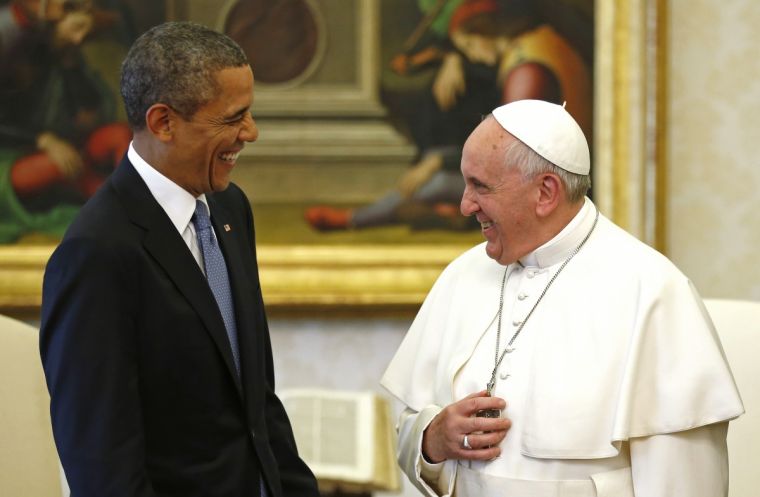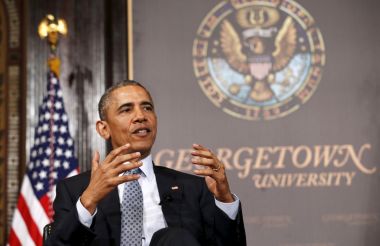Obama and the Catholic Church: How Pope Francis has changed the conversation

Pope Francis' emphasis on caring for the poor was an influential factor in bringing together President Obama with left and right wing thinkers in a panel discussion on poverty in the US at a Catholic-Evangelical Leadership Summit, at Georgetown University, Washington yesterday.
The Overcoming Poverty Summit, attended by 120 religious, political and civic leaders, was organised by university's Initiative on Catholic Social Thought and the National Association of Evangelicals. John Carr, head of the Initiative, said the summit was a "direct response" to Pope Francis' "challenge to place the lives and dignity of the poor at the center of religious and public life."
At the event, the President said that faith-based groups "have the capacity to frame" the importance of overcoming poverty. "And nobody has shown that better than Pope Francis," he said, adding that the Holy Father had "been transformative, just through the sincerity and insistence that he's had that this is vital to who we are; this this is vital to following what Jesus Christ our saviour talked about.
"And that emphasis I think is why he has had such incredible appeal, including to young people, all around the world," Obama added. "I hope that is a message that everybody receives when he comes to visit here."
The President's relationship with the Catholic Church has been stymied by his views on abortion and his controversial health care reforms. But in the Pope Francis era, where there seems to be more personal affinity as well as great respect, things may be looking up.
Although Francis undoubtedly holds the same orthodox views on contraception, abortion and same-sex marriages as his predecessor, these issues are not the primary ones for which he has become known. Outside the Church at least, he is instead seen as the Pontiff who has eschewed some of the luxuries of his station and championed the dignity of the homeless outside his front door.
At the heart of yesterday's meeting was a desire to overcome the barriers that divide people who care about family values and those who care about social justice, for the sake of the poor – essentially seen as the divide between right and left, particularly among faith groups.
Obama criticised some faith groups for viewing poverty as a secondary issue. "This is oftentimes viewed as a nice-to-have relative to an issue like abortion," he said, adding that even if that wasn't true, it was the way it was perceived in political circles. But he called on faith-based groups to make the most of its voice to benefit the poor. "There's more power to be had there, and more transformative voice that's available," he said.
Obama and the Catholic Church
Obama attended a Catholic school, while living in Indonesia for a short period during his childhood. More significantly, the President has spoken of the influence of his time spent working as a community organiser in Chicago in the 1980s on his spiritual and social views. His job as director of the Developing Communities Project was to take initiatives that were working well in Catholic communities and introduce them in poor black Protestant communities. He was funded through the Campaign for Human Development, the social justice arm of the Catholic Church and his office was in Holy Rosary Church, where he took smoking breaks with the priest, according to an article in the New York Times.
The President doesn't have a particularly rigid view of Christian spirituality – or indeed religion in general, judging from an in-depth interview about his faith from 2004. While in Chicago he became a member of Trinity United Church of Christ. Since being in the White House he hasn't stuck to one church in particular, but attended a number of different churches, from different denominations, including St John's Episcopal Church across the road from the White House, but this First Family haven't been regular churchgoers.
His pro-choice views on abortion haven't necessarily made him a natural friend of the Catholic Church, and he has clashed numerous times with the Catholic bishops in the US. At both elections, Obama won the Catholic vote – with 54 per cent in 2008 and 50 per cent (48 to Romney) in 2012, and with more decisive support among Hispanic Catholicss. But shortly after his election in 2008 Cardinal Francis George, then Archbishop of Chicago who died earlier this year, wrote to Obama warning him about the bishops' concerns over religous freedoms and his views on abortion. And in 2012, all 181 bishops issued statements or opinion pieces condemning Obama's healthcare reforms over the requirement that health insurers should provide contraception free of charge.
Obama and the Popes

When the President met Pope Benedict XVI for the first time in 2009, the Pope underscored the Catholic Church's position on abortion and stem cell research, and gave the President a copy of a Vatican document on bioethics. While cordial, Obama's relationship with Benedict wasn't exactly chummy.
With Pope Francis, however, there are signs that things are a little easier, and the President has said he is a "great admirer" of the current Pope. Reports of their first meeting at the Vatican in March last year, emphasised their combined interest in working to benefit the poor – though the Pope almost certainly would have mentioned his stance on other ethical issues. Even so, Francis said he hoped the President would "feel at home" at the Vatican and the Pope's gift this time was his Apostolic Exhortation Evangelii Gaudium ('The Joy of the Gospel'), which Obama warmly received.
Since then, the Pope has played an influential role in restoring diplomatic relations between the US and Cuba, and the visit will be returned, with the Pope's visit to the US in September already attracting much interest. It is also thought that the Pope will be one of Obama's key allies as he tried to raise the profile of environmental concerns, said to be one of the topics of discussion at their next meeting.
Obama has often positioned himself as working for the middle class, but more recently has turned to emphasise the needs of the poorest and America's growing inequality. The Baltimore riots following the death of Freddie Gray, and protests about institutional racism in the police, have brought racial tensions to the fore. In the wake of Gray's death he called for national "soul searching" about the underlying causes of poverty, particularly in urban communities. As the first black president, and with his history of working with poor African-American communities, Obama is uniquely placed to advance the conversation about inequality in the US.
While he remained sceptical yesterday at the hope of getting Republicans and Democrats to agree on concrete policies, he expressed hope that Pope Francis' visit would help to further raise the profile of the issues at stake. "I can't wait to host him, because I think it will spark an even broader conversation of the sort that we're having today," he said.











